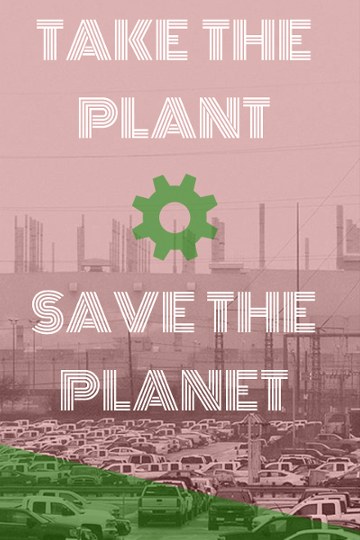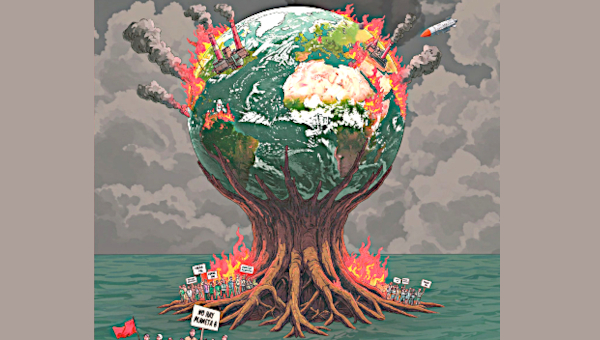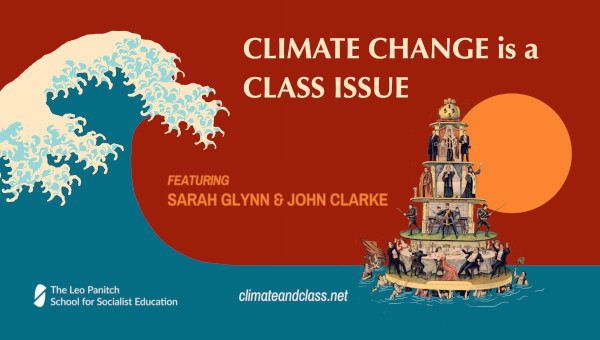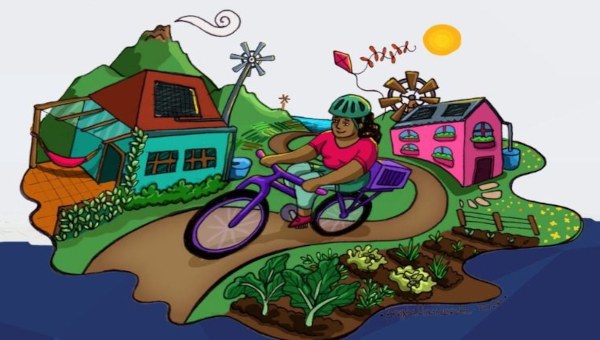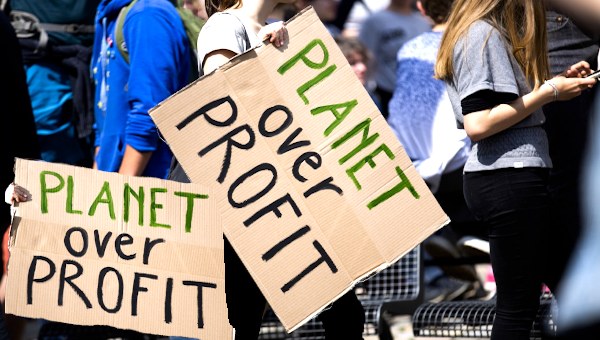Ecosocialism: The Strategic Debate
Those of us who inhabit planet Earth in the 21st century face a huge problem. Our own species, homo sapiens (modern humans), are trashing the planet at an ever increasing and more destructive rate.
If this continues the ability of the planet to sustain life (human life in particular) could be gone within decades. We are the first with the information to understand the full depth of this crisis, and we are likely be the last with the chance to do anything about it. No other generation has faced such a challenge or such a responsibility.
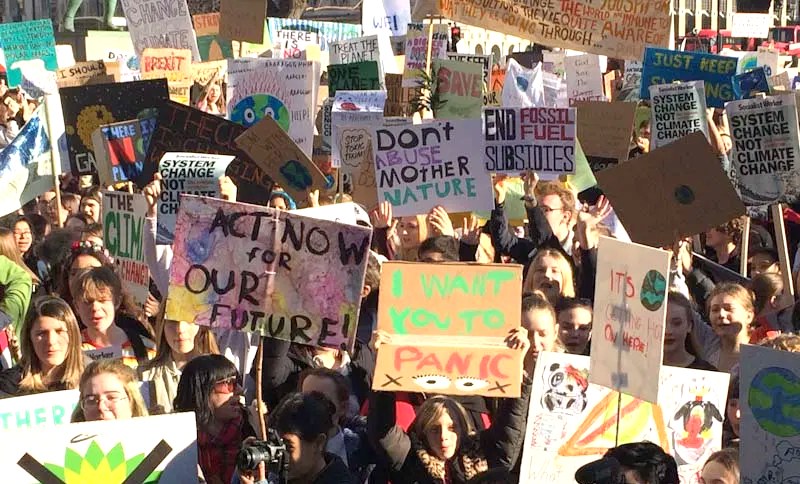
Science is telling us that we have 10 years to hold the global temperature increase to a maximum of 1.5°C. After that dangerous and irreversible feedback process could take control.
Temperature records continue to be broken with frightening regularity. Floods, droughts and wild fires are more intense and more frequent. At the time of writing the West coast of America was facing catastrophic wildfires that had consumed over 3 million acres – described by a Senator from Oregon as “apocalyptic.” A similar catastrophe is taking place in the Brazilian Pantanal, the world’s largest tropical wetland, where thousands of wildfires are burning out of control.
Artic sea ice will soon be gone. Parts of Antarctica are warming 5 times faster than the rest of the planet. Both the Greenland and Antarctic ice sheets are destabilising – the melting of which would raise the sea level by up to 20 metres. This would obliterate swathes of the most densely populated parts of the globe. The worlds permafrost is now melting 50 per cent faster than was previously thought – with the potential to release vast quantities of methane, a powerful greenhouse gas (GHG). Here in Britain, this summer, we have seen a record number of days in excess of 34°C.
The starting point for addressing all this is an ecosocialist world view. But there is a long way to go. Whilst the concept is more widely accepted today than ever before, there is, as yet, no common view as to what exactly it implies. To some it simply means taking the environmental struggle more seriously, to others (including us) it redefines the socialist project. We are no longer engaged in a struggle ‘simply’ to end capitalism and replace it with a democratic and socially just society. The task today is to replace capitalism with a society that is sustainable for the long term and capable of constructing a new, and none-exploitative, relationship between human beings and nature.
Meanwhile a major opportunity to decarbonise the global economy is being squandered as we speak. It is a crime against humanity. Trillions of dollars are set to be spent by governments to rebuild from the Covid crisis. Instead of grasping the opportunity to start to build a sustainable low-carbon future, with a new relationship with nature, this money is being used (scandalously) to replicate the same disastrous paradigm with growth as the central objective. As the global economy grows – assuming it survives Covid 19 – so does global warming and environmental destruction. Natural resources are over-exploited to the point of exhaustion. More waste is being dumped into the biosphere than it can absorb leading to dysfunction and collapse.
The Nature of the Crisis
Some on the left argue that we face a triple crisis: i.e. the biggest economic crisis for 300 years; an existential ecological crisis; and a medical crisis arising from Covid-19. There are, however, two important caveats to such an analysis.
First, if we have just 10 years in which to reach zero carbon, after the revolution will be too late. You can’t build socialism on a dead planet. Our task, therefore, is to force the elites to make major structural changes, in the here and now, whilst capitalism still exists – including the complete decarbonisation of the global economy and its replacement by renewable energy.
Second, we must insist that Covid-19 is not in a separate medical category but is a fundamental part of the ecological crisis itself. The definition of ‘ecology’ is, after all, the relationship between living organisms.
Such an approach allows us to locate the increasing danger of zoonotic spillover pathogens from other species where they belong. They are a product of the trashing of nature, on an industrial scale, by both Western industrialised agriculture – not least intensified meat production and deforestation – and by Asian wet markets and the bushmeat trade. These factors are compounded by rising population density – particularly urban density which increases at twice the global rate. This is further boosted by unprecedented levels of global connectivity that now exist – particularly air travel.
This approach also allows us to recognise that such pandemics can only be prevented, ultimately, by a completely different relationship between human beings and the natural world than exists at the present time. Whilst the current relationship continues (or anything like it) there will be no solution. Scientists estimate that we could soon be facing up to 5 potentially deadly pathogens crossing over from other species ever year any one of which could escalate into a disastrous pandemic.
Multi-Dimensional
The complexity is compounded by the multi-dimensional nature of the ecological crisis itself – which cannot be reduced to climate change, important as it is. The ecological crisis takes the form of a series of parallel crises each capable of threatening life on the planet in its own right. These threats have been identified by the Stockholm Resilience Centre as ‘planetary boundaries’ – the crossing of which can do irreversible damage to the ecosystems of the planet.
Other species are becoming extinct at a rate of between a 100 and a 1,000 times faster than the ‘natural’ or ‘background’ rate. This is now recognised as the ‘sixth mass extinction’ – the biggest extinction event since the demise of the dinosaurs 65 million years ago. The World Wild Fund (WWF) 2020 Living Planet Report, published in April this year, reveals that mammals, birds, amphibians, reptiles and fish have suffered a two-thirds decline in less than half a century.
The demand for fresh water has long outpaced replenishment. By 2025 (according to the UN), an estimated 1.8 billion people will live in areas facing serious water shortages, with two-thirds of the world’s population living in water-stressed regions. As rivers dry up, conflicts over water become more intense. In just three countries – India, China and Pakistan – farmers pump out around 400 cubic kilometres of ground water a year.
(At the time of writing, in Mexico, farmers are throwing petrol bombs, setting vehicles ablaze, blocking highways, and attacked highway toll booths, over the diversion of water from the La Boquilla dam to the USA whilst Mexico is itself is experiencing severe drought.)
The problem of feeding today’s 7.6 billion people, and potentially 10 billion by the end of the century, without destroying the biosphere of the planet in the process, remains unresolved. Industrialised agriculture uses 70 per cent of all available fresh water and is responsible for 60 per cent of global biodiversity loss and 70 per cent of deforestation. It is also using ever greater quantiles of nitrogen fertiliser with ever diminishing efficiency. As a result a greater proportion than ever before is being washing into rivers and oceans with catastrophic results.
Remarkably, the greenhouse gas (GHG) emissions (CO2 and methane) generated by meat production are greater than those generated by the entire world-wide transportation system combined: cars, trucks, trains, ships and aircraft!
The run-off from the nitrogen fertiliser used in cattle feed for meat production is creating oceanic dead zones – a frightening new form of pollution. There are now 405 dead zones covering 95,000 square nautical miles in which everything is dead in the lower layers due to lack of oxygen. Add to this the rising sea temperature and oceanic acidification and the scale of the problem is clear. Coral reefs, for example, one of the most prolific echo-systems on the planet could disappear within a few years. The meat industry, we should remember, is not just polluting our oceans, destroying our soil, and damaging our health; it is facilitating the spillover of dangerous pathogens that threaten our very existence.
We have to demand the end of such agriculture and its replacement by “food sovereignty,” a term coined by Via Campesina in 1996, which would empower those who produce, distribute, and consume the food to control the mechanisms of production and distribution.
We welcome the trend towards reduced consumption of meat and dairy products given their impact on the natural world and the level of GHG emissions and water consumption involved. Whilst veganism and vegetarianism, on their own, are not enough we support policies to make affordable, healthy alternatives to animal products widely available eg in schools and hospitals.
Climate Change
The Paris COP22 in December 2015 took place in the shadow of the failures of Kyoto and Copenhagen. In the run up to it mass mobilisations took place around the world demanding decisive action. London saw its biggest climate demonstration ever, with 70,000 people on the streets. There were demonstrations and protests in Paris itself during COP, despite the imposition of a state of emergency by the French Government following terrorist attacks which killed 130 people the month before.
The main proposition put to the Paris COP was to restrict global warming to a maximum temperature increase, over the preindustrial level, of ‘well below 2°C’. This was an advance over the Copenhagen target which had been to restrict the increase to not more than 2°C. It was, however, was bitterly resisted by those countries and island states at greatest risk from rising sea level, some under imminent threat of submergence. They were organised into what they called the High Ambition Coalition, which was led by the Marshall Islands. They put up a ferocious fight for a maximum increase of 1.5°C rather than 2°C around the slogan ‘1.5°C to stay alive’.
In the end there was a fudge and both were accepted, though not with equal status. The main target would be ‘well below 2°C’ with a further limit of 1.5°C accepted as an ‘aspiration’: ‘recognising that this would significantly reduce the risks and impacts of climate change’. It was still, however, an important gain. Once adopted, even in the flawed way it was, it would not go away.
Paris was also the first time there had been a unanimous recognition of what climate scientists and campaigners had been saying for many years: that anthropogenic climate change is a real and urgent threat and will have disastrous consequences for hundreds of millions of people if the burning of fossil fuels is not stopped. Also for the first time, at a COP, neither the scientific basis of global warming, or its anthropogenic character, was disputed. This was an important step forward and a big blow to climate scepticism.
These gains, however, were not reflected in the practical decisions taken in Paris. The INDCs (Intended Nationally Determined Contributions) adopted were totally inadequate and would result not in global temperature increase of 2°C by the end of the century – far less of 1.5°C – but in a disastrous 3.4°C from which there would be no way back. Since fossil fuel emissions have risen by a further 4% since then they would have to fall by 7.6% every year from now until 2030 to stay within the 1.5°C ceiling. We, therefore, have a mountain to climb in Glasgow next year when the INDCs are due to be upgraded into something that can actually tackle the problem.
The IPCC’s Special Report on Global Warming
Two years later, in October 2018, the stakes were raised again with the publication of the IPCC’s Special Report on Global Warming – which officially adopted the 1.5°C target, and concluded, moreover, that we had just 12 years to implement this, since crucial tipping points could come into play as soon as 2030.
Zero carbon by 2030, however, is a major challenge. It means forcing major structural changes at every level of society very quickly. It means demanding massive governmental investment in energy systems based entirely on renewables. It means a major transfer of wealth to the impoverished countries to facilitate their transition and lift them towards western levels of development. It also means major reductions is energy usage/wastage to go alongside the introduction of the new system.
The IPCC Report put it this way: “Pathways limiting global warming to 1.5°C with no (or limited) overshoot would require rapid and far-reaching transitions in energy, land, urban and infrastructure (including transport and buildings), and industrial systems. These systems transitions are unprecedented in terms of scale, but not necessarily in terms of speed, and imply deep emissions reductions in all sectors, a wide portfolio of mitigation options and a significant upscaling of investments in those options.”
It also means, it should be said, rejecting the concept of ‘net-zero’ carbon (i.e. taking offsets into account) which is simply an escape clause the get around important targets.
The Role of the Left
The left, however, will need to raise its game substantially if it is to play a significant role in this struggle. Its current level of commitment is far from a commensurate response to an existential threat to life on the planet. This reflects the disastrous record of the left in the second half of the 20th century, when it not only shunned the emerging environmental movement in the 60s, 70s, and 80s – often dubbing those involved as middleclass liberals – but it fully signed up to the dominant growth and productivist agenda of the day, only starting to break from it in recent years. This applies to both the radical left and the social democratic left in the Labour Party and the trade unions.
In the 1976s – 14 years after the publication of Rachel Carson’s game-changing Silent Spring – The Alternative Economic Strategy (AES), the bible of the Bennite left in both the LP and the trade unions, was based entirely on growth and productivism. Its key chapter “A Policy for Expansion” tells us that: “The essential basis for any alternative economic strategy must be a policy for planned economic expansion.” The environment, on the other hand, was not mentioned once in its 150 pages. There were challenges to this – not least from Raymond Williams whose work through SERA in the 1980s took a very different tack. Unfortunately it is the AES approach which is still largely followed when unions like UNITE are confronted today with redundancies in the aviation or cars sector, policies of Just transition don’t get a look in.
Today the radical left remains behind the curve. It still has no exit strategy from fossil energy that goes beyond appeals for global system change. It also continues to shun a transitional approach – which is the key strategic element in the ecological struggle.
A transitional approach would recognise that the prospect of global system change within 10 years is remote in the extreme. The actual strategic challenge we face today – which is implied by the 2018 IPCC Special Report – is not system change within 10 years but an all-out struggle to force the elites (however reluctantly) to make the structural changes needed to halt global warming in the 10 years we have left. It is a struggle that we should, and would, carry out within the context of an overall struggle to end capitalism and establish a sustainable ecosocialist society.
Reforms are not necessarily reformist. The most effective road to revolutionary change is via the struggle for partial and transitional demands – zero carbon by 2030 being a prime example. The struggle for such demands generates both self-organisation and ecological consciousness and can take the struggle to a higher and more radical stage. In any case if we are unable to build the kind of movement capable of forcing capitalism to make big changes how are we going to build a movement capable of its expropriation by revolutionary means? We cannot end capitalism just by calling for it to end – however often we repeat ourselves.
We are not opposed to revolutionary change – quite the reverse. But to gamble the future of the planet on such an unlikely scenario as global revolution within 10 years is reckless in the extreme. There are no signs that such a revolutionary wave is on its way, and there are no proposals from its advocates as to how to bring it about. Politics, internationally, is still moving to the right. Some comrades talk about creeping fascism – there is certainly creeping authoritarianism. Trump could even be re-elected in November, which does not suggest a global balance of forces in favour of global ecosocialist revolution.
Derek Wall puts it very well in his new book Climate Strike, where he says the following:
“The challenge is that if the economic system, indeed the basic social system, needs to be transformed to protect humanity and the rest of nature, this cannot be achieved easily or quickly. Climate change and less visible environmental threats demand almost instant action, so interventions are necessary immediately. Therefore, the politics of climate change needs to take a seemingly contradictory approach, intervening directly and immediately to slow emissions but working in a more fundamental and long-term way to promote the creation of a different way of life with all the complexities and institutions and practices that this demands.” (page 2)
Interestingly, the radical left does not propose social revolution as a prerequisite to other major arenas of struggle, so why with the ecological struggle? In the women’s movement, for example, the left engages in the struggle (often successfully) for major change here and now, whilst capitalism still exists. It sees the struggle for reforms as a part of the overall struggle against capitalism itself – including the struggles against poverty wages, racism, homophobia, and for civil and human rights.
Nevergoodenoughism
Some on the left, who call for global system change as the immediate solution, then oppose some of the key demands for radical change in the here and now. Such changes, it is argued, are either greenwash, not revolutionary enough, or have some defect that is unacceptable. We could call it nevergoodenoughism. Many of them would argue that they do support a transitional approach, but just not these specific proposals, whilst failing to put forward demands to illustrate this.
Road transport, which accounts for around 20 per cent of global CO2 emissions, is a prime example. According to the European Environment Agency cars are the biggest culprit, producing a massive 60.7% of such emissions. Heavy vehicles produce 26.2%; light commercial vehicles 11.9%; water navigation 13.6%; civil aviation 13.4%; and railways 0.5%. The WHO has identified motor vehicles emissions as the single biggest environmental outdoor health risk in the world, contributing to 3.7m deaths a year. Yet many on the radical left oppose electrification, a measure that would have an immediate benefit – even if this means the continuation of the internal combustion engine (ICE).
Even the decision of an increasing number of governments to make the internal combustion engine (petrol and diesel) illegal within between 10 and 40 years – 15 years in the case of the UK. This – despite the proposals at the high end of the scale – has effectively spelled the end of the ICE since the industry is forced to respond to the earliest date and not the most remote because its timescale for retooling for new models is around 10 years. Automotive manufacturers – after decades of blocking electrification in alliance with the oil producers – are now scrambling to introduce electric models. The left appears totally indifferent to the whole thing. An article on electric cars can be found at “The electric cars revolution.”
Many on the left have also been opposed to congestion charging (i.e. pollution charging) in city centres. SR supports Congestion Charging, as well as Low Emission zones to reduce urban traffic and pollution. SR also campaigns for accessible, free, safe and reliable public transport available 24-hours a day and staffed by unionised and well-paid workers.
Another major no-no on the left has been any notion personal environmental responsibility for our own carbon and ecological footprints: i.e. paying more attention what we eat, particularly meat, the means of transport we choose, and the amount of energy we waste, and the amount of waste we generate. This was called for by the IPCC Report that recognised that whilst the main responsibility for such change is institutional and governmental, there is also an important personal responsibility involved – in the rich countries in particular. Personal responsibility and behaviour is something supporters of for example the women’s liberation movement have always taken seriously – the personal is political – and expect standards of behaviour in people’s personal lives
Opposition to putting demands on governments or governmental institutions – such as the UN or the COP process – is another feature of this, which has recently emerged again in the shape of the Glasgow Agreement in advance of the Glasgow COP.
Make the Polluters Pay for the Solution
Forcing major structural change against the will of the elites will need a mass movement, something that is most effectively generated via high impact demands that can command mass support, not just amongst environmental activists but amongst the wider population as it is impacted by the crisis.
The key to this is to make fossil fuel far more expensive than renewables by means that are socially just, redistributes wealth from the rich to the poor, can bring about a big reduction in emissions in the time available, and (crucially) is capable of commanding popular support. This means heavily taxing the polluters to both cut emissions and to ensure that the polluters fund the transition to renewables.
One proposal on the table in this regard is James Hansen’s fee and dividend proposition. It provides the framework for a very big emissions reductions, here and now whilst capitalism exists, and on the basis of a major transfer of wealth from the rich to the poor (as argued above) in order to drive it forward. It would need, as he recognises, to go alongside a crash programme of renewable energy production to meet the demand that his incentives would create. It would also need a major programme of energy conservation, a big reduction in the use of the internal combustion engine, the abolition of factory farming and a big reduction in meat consumption.
It might be expected that the left would support such taxation – since it supports taxing the rich – but this is not the case. Most on the radical left oppose carbon taxes with a ferocity that is hard to understand. Interestingly they don’t call for the repeal of the already existing carbon taxes on petrol and diesel, for example. This is presumably because they don’t want to be associated with what is in fact a right-wing climate denialist agenda.
It is sometimes argued that taxation can be regressive – which is indeed true. It they are however, we should oppose them. We should only support such taxes if they are introduced as a part of an overall taxation system that is socially progressive that compensates the poorest people when they are disproportionately affected by a particular tax. It is perfectly possible to do this; it is a political choice.
There is a crucial political point involved in this as well. This is that cutting emissions this way is in the end the only progressive/democratic way of doing it since it means that such taxation can be carried out within the framework of an overall taxation system that is heavily progressive. The other alternatives, often advanced by the left, such as production cuts by government decision or rationing do not work, indeed can have serious consequences. Such action would generate a popular backlash along the lines of the yellow vests, and rationing would create a black market.
Progressive carbon taxes, properly applied, however, can be the driving force that can bring down carbon emissions rapidly and open the door to wider change. We should not insist on Hansen in all its detail. There may well be other proposals on similar lines now or in the future that could be considered – but let’s have the discussion.
Major carbon taxes already exist in most countries in the form of taxes on petrol and diesel for road usage that is not part of a progressive agenda, or not sufficiently so. It is important that the left defends the need for carbon taxes and presents them in the context of a redistribution of money from the rich to the poor.
Aviation and maritime fuels, however, remain completely untaxed, although they account for a rising share of global energy-related carbon emissions (currently at 4 per cent). These fuels were explicitly excluded from the Kyoto Protocol and they are not subject to the taxes widely applied to road transportation fuels. There have been some important campaigns around this, led by Oxfam and the WWF for example.
Is Real Change Possible?
The notion that nothing significant can be changed whilst capitalism still exists is not only inhibits the struggle but is not historically accurate.
The level of popular consciousness on the environmental crisis has been transformed in recent years.
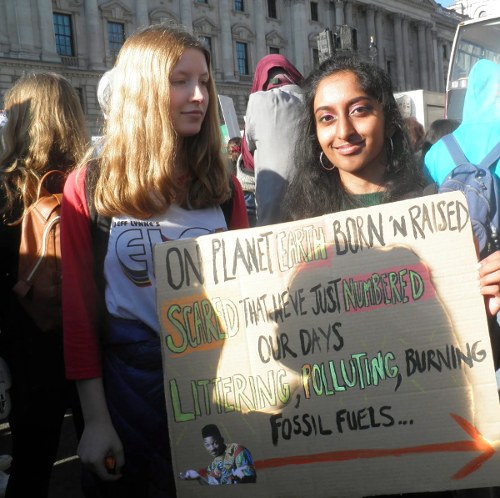
Many important changes have been won while over the past 50 or 60 that amount to very significant change. There have been victories against nuclear power, for example in Germany and Japan – also against airport expansion. The international campaign to save the whales in the 1970s and 1980s resulted in the 1986 moratorium on commercial whaling and massively reduced the slaughter that had been taking place since the middle of the nineteenth century. Currently, Japan, Russia, and a number of other nations continue to oppose this moratorium.
The hole in the ozone layer has also been repaired, for now at least, by an 80 per cent reduction in the use of CFCs since the signing of the Montréal Protocol in 1987. Fracking in Britain has been halted after a long campaign. The recent decisions to impose charges on plastic bags can make a huge difference in terms of plastic pollution. Just look at the impact of BBC TV’s Blue Planet II on the plastic pollution and biodiversity debate. Even the inadequate level of renewable energy now being generated would not exist but for decades of campaigning by environmentalists. In fact, the chance to make fundamental change is created in the course of the struggle for partial and immediate change.
The Agency for Change
Stopping climate change and environmental destruction will require the broadest possible coalition of forces ever built. It should embrace Naomi Klein’s Blockadia, in which she includes what she calls ‘the new climate warriors’ – those in the forefront of struggles against the extractive industries in particular, pipe-lines, open caste mining, and fracking.
It must include those defending the forests and the fresh water resources and those that are resisting the damming of rivers that destroy the existing ecosystems. It must include the indigenous peoples who have been the backbone of so many of these struggles along with the young school strikers, and those supporting them who have been so inspirational over the past two years. And it should include the activists of XR who have brought new energy into the movement over the same period of time,
It will also need to embrace the more radical Green Parties alongside the big NGOs such as Friends of the Earth, Greenpeace, WWF, the RSPB, which have grown and radicalised in recent years alongside the newer groupings that have come on the scene such as Avaaz and 38 Degrees. These organisations have radicalised, particularly in the run up to Paris, and have an impressive mobilising ability. Such a movement has to look wider, to embrace the trade union movement, and also the indigenous peoples around the world along with major social movements, such as La Via Campesina and the Brazilian Landless Workers Movement (MST).
The involvement of the trade unions is crucial, though it remains difficult in such a defensive period. Progress has nevertheless been made via initiatives such as the campaign for a million green jobs in Britain, which has the support of most major trade unions and the TUC, and the ‘just transition’ campaign (i.e. a socially just transition from fossil fuel to green jobs) which has the support of the ITUC at the international level, and addresses the issue of job protection in the course of the changeover to renewable energy. In this way it opens the door for a deeper involvement of the trade unions in the ecological struggle.
The real test, however, will be whether as the impact of the crisis unfolds, Blockadia can embrace a much wider movement drawing in the many millions who have not been climate activists but are driven to resist by the impact of the crisis on their lives and there chances of survival. This means precisely demands, such as outlined above, that can link rapid reductions in GHG emissions to a transfer of wealth from the rich to the poor.
Meanwhile the campaigning focus over the next year has to COP 26 in Glasgow, which has the task of transforming Paris into something that works. We have to mobilise to demand that it does so exactly that, and reject those who argue that governments and international institutions should not be our focus. The COP conferences have been a rallying point for many years and this one is the most important yet. The task for ecosocialists, and indeed for the wider movement, is to demand its full implementation, and to build the movement and advance the struggle in the process. Anything less would be to deny the movement its best chance to take the struggle forward.
The model for challenging the elites on all this has been provided in spades by Greta Thunburg, and the movement she has led. This was to demand that they act to reverse this situation and reject their excuses for not doing so. This is the stance we must take in Glasgow next year – demand that they act. Environmentalists are right to point out that governments can make major changes fast when they decide to do so – for example wage war. They can transform their economies within months. The Covid crisis itself has also taught us is that governments can find vast sums of money when they decide to do so.
In the end, if capitalism is faced with the destruction the planet’s capacity to sustain human life, and with increasing environmental disasters in rich parts of the world, they will finally act to resolve it. The problem is that they will leave it until it is too late to avoid massive destruction; and they will carry it out by dictatorial means and at the expense of the most impoverished people on the planet. The struggle to save the planet, therefore, can be defined more precisely as a struggle to save the planet in a way that is democratic, socially progressive, and ecologically sustainable. •
This piece has been written for discussion at a conference of Socialist Resistance supporters in November.


